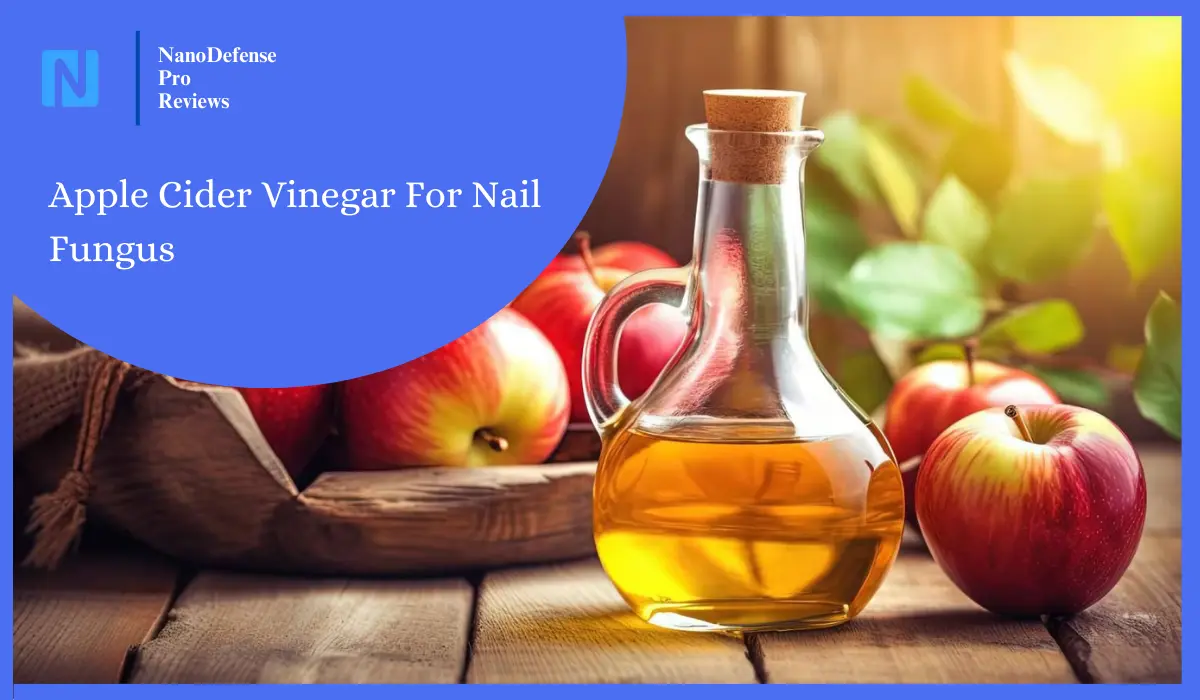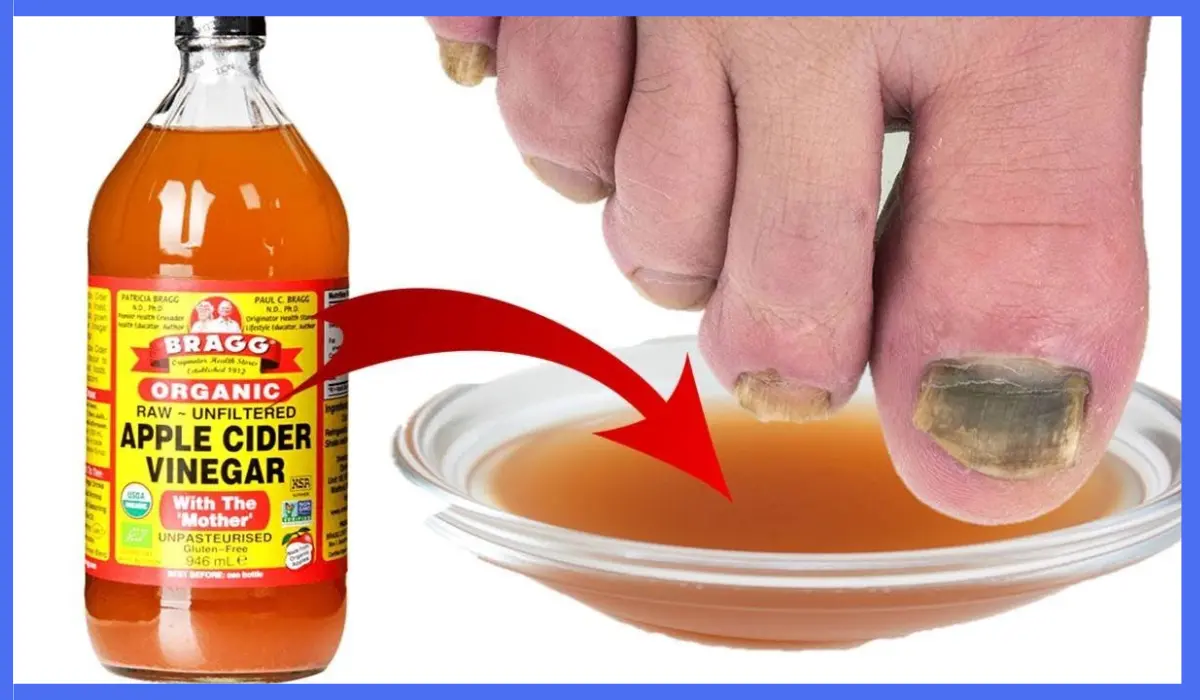How Does Apple Cider Vinegar For Nail Fungus Work?
Apple cider vinegar (ACV) is believed to combat nail fungus due to its acidic properties, which create an inhospitable environment for fungal growth. ACV’s acetic acid may help to kill fungi and bacteria, while its antifungal properties may aid in inhibiting their spread. Additionally, ACV’s natural pH balance may restore the nail’s acidity, further thwarting fungal growth. Regular application of diluted ACV to affected nails can potentially reduce nail fungus over time.

Disclaimer: This article has been generated with the assistance of AI tools. While our research team has fact-checked the content, readers should independently verify information for accuracy and reliability.
Apple cider vinegar (ACV) has long been touted as a natural remedy for various health conditions, including nail fungus. The purported antifungal properties of ACV have sparked significant interest in its potential to treat onychomycosis, a common fungal infection of the nails.
The Science Behind ACV’s Antifungal Properties

Several studies have explored the antimicrobial effects of ACV, particularly its ability to inhibit the growth of Candida albicans, a common fungal species responsible for nail infections1. The active ingredient in ACV, acetic acid, is believed to be the primary driver of its antifungal activity. Acetic acid has been shown to disrupt the cell structure and enzyme function of various fungal species, effectively inhibiting their growth and proliferation.
Mechanism Of Action
The proposed mechanism by which ACV exerts its antifungal effects on nail fungus involves several key steps. Firstly, the acidic nature of ACV creates an unfavorable environment for fungal growth, as many fungal species thrive in more neutral or alkaline conditions. The acetic acid in ACV penetrates the fungal cell wall, disrupting the cell membrane and interfering with essential cellular processes, ultimately leading to the fungus’s demise.
Practical Application
To harness the antifungal properties of ACV for nail fungus, a common approach is to soak the affected nails in a diluted ACV solution. This allows the acetic acid to come into direct contact with the fungal infection, potentially inhibiting its growth and promoting the restoration of healthy nail tissue. The duration and frequency of these ACV foot soaks can vary, with some studies suggesting daily or weekly soaks for optimal results.
What Are The Antifungal Properties Of Apple Cider Vinegar?
The antifungal properties of apple cider vinegar have been a subject of interest and research. Studies have indicated that apple cider vinegar contains components, such as acetic acid, that exhibit antifungal activity against various fungal species, including Candida albicans. Research has shown that apple cider vinegar can inhibit the growth of fungi like Candida spp., making it a potential therapeutic option for conditions like denture stomatitis. While further human trials are needed to confirm and strengthen these findings, the existing evidence suggests that apple cider vinegar possesses antifungal properties that may have applications in combating fungal infections.
Are There Any Side Effects Of Using Apple Cider Vinegar For Toenail Fungus?
Based on the provided sources, there are potential side effects associated with using apple cider vinegar for toenail fungus treatment. While apple cider vinegar is believed to have antifungal properties and is a popular home remedy, it is essential to be aware of the following potential side effects:
- Upset Stomach: Apple cider vinegar’s acidity may cause digestive issues like an upset stomach when consumed or applied in high concentrations.
- Skin Problems: Direct application of undiluted apple cider vinegar on the skin can lead to severe skin problems, including burns.
- Jaundice: In some cases, excessive use of apple cider vinegar may lead to jaundice, a condition characterized by yellowing of the skin and eyes.
It is crucial to dilute apple cider vinegar properly before use to minimize the risk of side effects. Additionally, individuals with sensitive skin should take extra precautions when using apple cider vinegar to avoid skin irritation or burns. If any adverse reactions occur, it is advisable to discontinue use and consult a healthcare professional.
How Long Does It Take For Apple Cider Vinegar To Work On Toenail Fungus?
The time it takes for apple cider vinegar to work on toenail fungus can vary significantly depending on several factors, including the severity of the infection, the individual’s overall health, and the consistency of the treatment. While some people may experience improvements in a few weeks, others may require several months of treatment to achieve noticeable results.
The general approach is to soak the affected foot or feet in a solution of equal parts water and apple cider vinegar for about 15 to 20 minutes, twice a day. It’s recommended to repeat this process once or twice daily for several weeks or until improvement is seen. Some podiatrists suggest soaking for at least 30 minutes daily.
It’s important to note that apple cider vinegar may not work for everyone, and the results can vary from person to person. Additionally, while apple cider vinegar may aid in therapy, it is not a complete treatment in itself, and over-the-counter antifungal creams, ointments, or nail lacquers may be necessary for more severe cases.
If the toenail fungus is particularly resistant or causes significant nail deformity or discomfort, a surgical or procedural intervention might be recommended. In summary, while apple cider vinegar can be a helpful home remedy for toenail fungus, it’s essential to be patient and consistent with the treatment, as the time it takes to work can range from a few weeks to several months. It’s also important to consider consulting a podiatrist for further guidance and treatment options.
Sum Up
While ACV has shown promise as a natural remedy for nail fungus, it is important to note that the scientific evidence supporting its efficacy is still limited. Some studies have reported mixed results, and the effectiveness of ACV may depend on the severity of the fungal infection and individual response4. Additionally, it is crucial to consult with a healthcare professional before using ACV, as it may not be suitable for individuals with certain skin conditions or sensitivities.
In conclusion, the potential of apple cider vinegar as a natural treatment for nail fungus is an area of ongoing research and interest. The acetic acid in ACV appears to have antifungal properties that may inhibit the growth of fungal species responsible for onychomycosis. However, more robust clinical studies are needed to fully understand the efficacy and safety of ACV for this specific application.
References
[1] https://www.floridafoot.com/blog/item/136-how-apple-cider-vinegar-may-help-treat-toenail-fungus
[2] https://www.starhealth.in/blog/apple-cider-vinegar
[3] https://www.healthline.com/health/home-remedies-for-toenail-fungus
[4] https://www.healthshots.com/beauty/natural-cures/toenail-fungus-home-remedy-white-vinegar-vs-apple-cider-vinegar/
[5] https://www.mindbodygreen.com/articles/apple-cider-vinegar-for-toenail-fungus

Lisa Miller
Dr. Lisa Miller is a board-certified Dermatologist with over 15 years of experience treating a wide range of skin, hair, and nail conditions. She received her medical degree from the prestigious Columbia University College of Physicians and Surgeons and completed her dermatology residency at the University of California, San Francisco, one of the top dermatology training programs in the country. Dr. Miller is an active member of the American Academy of Dermatology and has authored numerous peer-reviewed articles and book chapters on the latest advancements in dermatological care. She is frequently invited to speak at national and international medical conferences, sharing her expertise with other clinicians. In her private practice, Dr. Miller takes a patient-centered approach, collaborating closely with each individual to develop customized treatment plans. She is passionate about empowering her patients to achieve optimal skin, hair, and nail health through a combination of the latest medical therapies and lifestyle recommendations.
